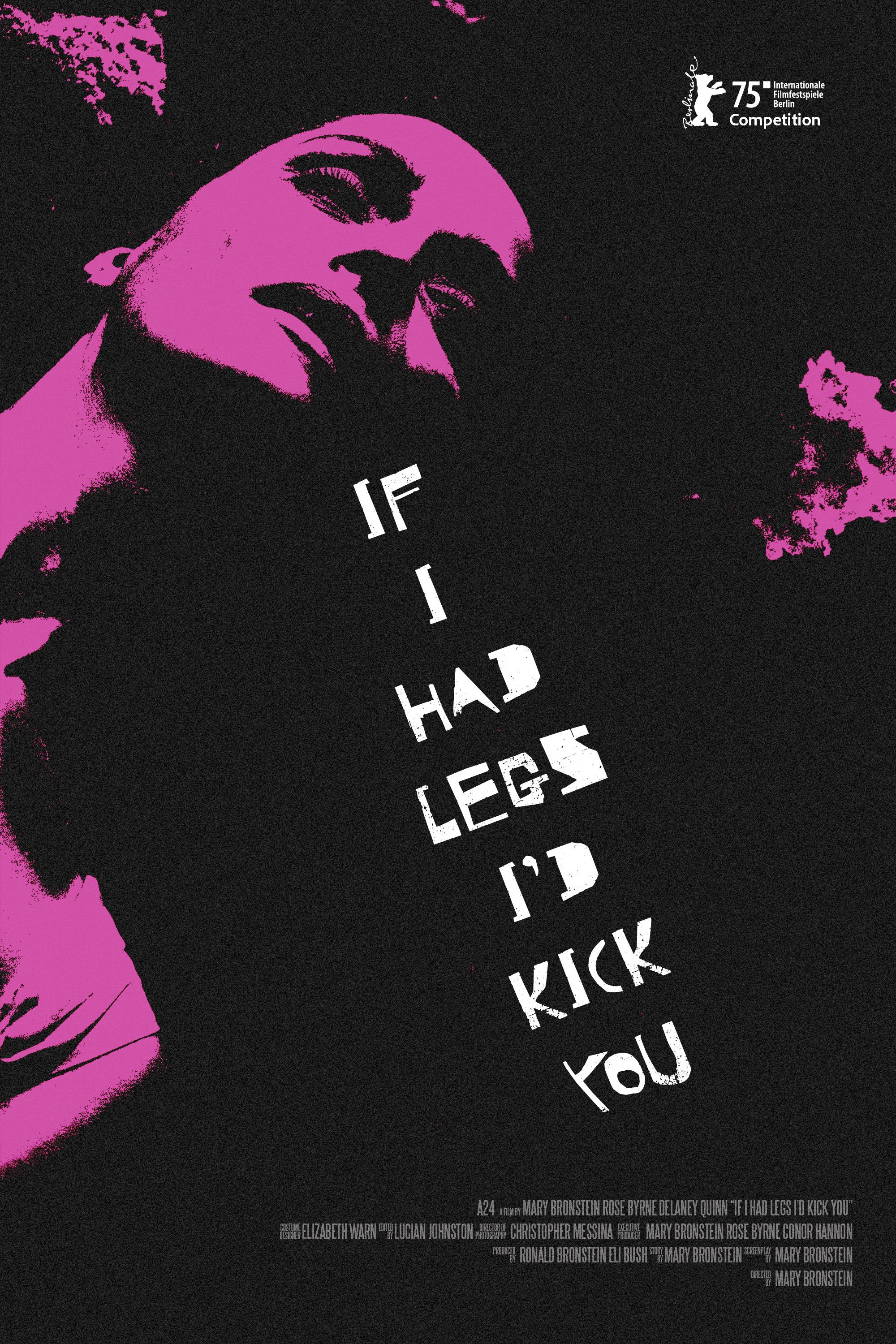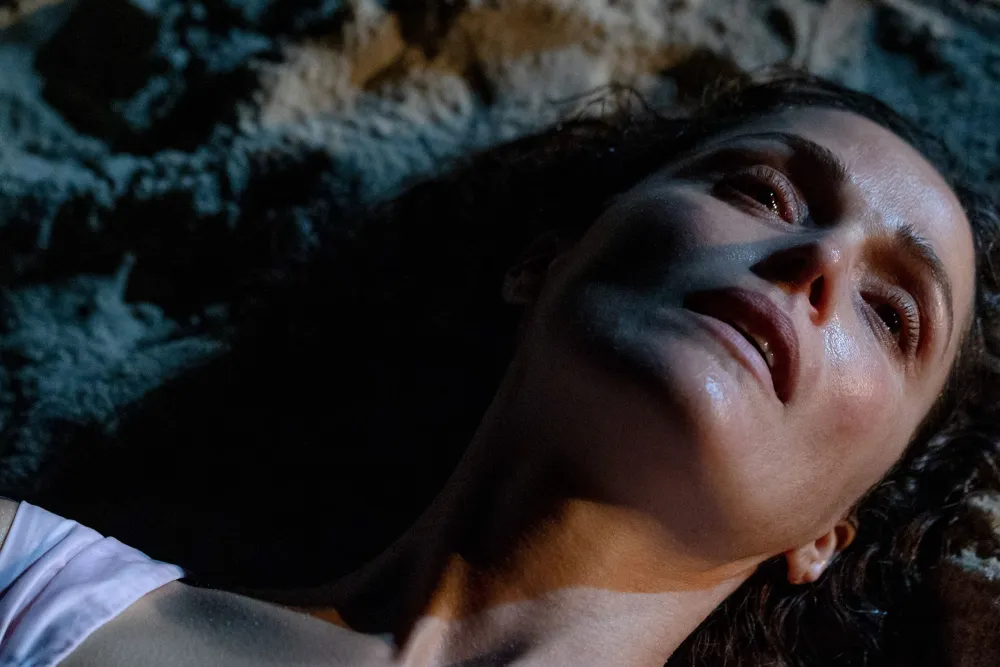If I Had Legs I’d Kick You is not your typical family film, and that’s precisely what makes it worth examining carefully before deciding whether it’s appropriate for your household. This 2024 independent drama, directed by Mary Bronstein and featuring Rose Byrne in a transformative performance, tells an unconventional story that challenges audiences to think about disability, autonomy, and human connection in unexpected ways.
The film’s provocative title alone signals that this is a movie unafraid to tackle difficult subjects with dark humor and unflinching honesty. For parents, the question isn’t simply whether the content is “safe,” but whether the complex themes and mature approach serve your family’s viewing goals. This guide will help you navigate that decision with comprehensive information about what to expect.
Plot Summary (Spoiler-Free)

If I Had Legs I’d Kick You centers on a woman in her late thirties who uses a wheelchair due to a degenerative condition. The story doesn’t focus on her disability as tragedy or inspiration—instead, it explores her complicated relationship with her able-bodied younger sister, who moves in temporarily to provide care during a particularly difficult health period.
What begins as a seemingly straightforward caregiving arrangement evolves into a tense psychological exploration of dependency, resentment, guilt, and the messiness of family obligation. The film examines how the sisters navigate their relationship when power dynamics shift, old wounds resurface, and both women must confront uncomfortable truths about themselves and each other.
The narrative unfolds primarily within the confines of a small apartment, creating an intimate, sometimes claustrophobic atmosphere that mirrors the characters’ emotional entanglement. Through dark humor, raw dialogue, and moments of genuine vulnerability, the film presents disability not as the defining characteristic of a person, but as one aspect of a fully realized, complicated human being.
What Parents Should Be Aware Of
Language and Profanity
This is where If I Had Legs I’d Kick You will present the most significant concern for many parents. The language is pervasive, strong, and decidedly adult.
Specific language content includes:
- Frequent use of the F-word throughout the film—approximately 40-50 instances across the 96-minute runtime, used in both casual conversation and heated arguments
- Multiple uses of other strong profanity including “shit,” “bitch,” “asshole,” and “goddamn”
- Several uses of crude sexual terminology during arguments
- One particularly intense scene where the sisters have a screaming match that includes a rapid-fire exchange of profanity lasting nearly two minutes
The language feels naturalistic rather than gratuitous—these characters speak the way many adults do in private, unfiltered moments. However, the frequency and intensity make this film completely inappropriate for children and questionable even for younger teens who aren’t accustomed to this level of profanity.
Parents should know that the strong language isn’t just sprinkled throughout—it’s integral to how these characters express frustration, humor, and intimacy. There are no “clean” sections you could easily preview with younger viewers.
Violence and Physical Conflict
Unlike many films with R ratings, If I Had Legs I’d Kick You contains minimal physical violence. However, the moments that do occur carry significant emotional weight.
Violence concerns include:
- One scene where the sisters have a physical altercation that involves pushing, grabbing, and the wheelchair-using sister attempting to strike her sister. While brief (lasting about 30 seconds), the scene is intense because of the vulnerability it exposes and the emotional rawness of the moment.
- A moment where a character throws objects across the room in frustration, breaking dishes and picture frames. No one is hurt, but the explosive anger may be disturbing to some viewers.
- Self-harm is implied in one scene—a character discusses past attempts without graphic detail or on-screen depiction, but the conversation is frank and emotionally heavy.
- One character experiences a medical emergency that involves visible physical distress, heavy breathing, and panic. While not gory, it’s uncomfortable to watch.
The film’s “violence” is primarily emotional and psychological rather than physical. The sisters wound each other with words far more effectively than physical acts, which in some ways makes the conflict more disturbing because it feels authentic and painful.
Sexual Content and Nudity
Sexual content is present but relatively limited and not gratuitous within the context of the story.
What appears:
- One sex scene between a secondary character and a partner, shown briefly with partial nudity (bare backs, shoulders). The scene lasts approximately 30 seconds and serves a narrative purpose about the main character’s feelings of isolation. No explicit detail or graphic content.
- Discussions about sex and sexuality occur in several conversations, including frank talk about the main character’s sex life (or lack thereof) and dating experiences as a wheelchair user. These conversations include crude language but aren’t titillating—they’re matter-of-fact discussions about adult experiences.
- Brief rear nudity in a bathroom scene where the caregiver sister helps with bathing. The scene is clinical and non-sexual, focusing on the uncomfortable intimacy required in caregiving situations.
- References to masturbation and sexual frustration in dialogue, handled with dark humor rather than explicit detail.
This aspect of the film is decidedly adult but not exploitative. The sexual content serves the story’s exploration of autonomy, privacy, and the complications of living in close quarters.
Thematic Content and Emotional Weight
This is where If I Had Legs I’d Kick You becomes most complex from a parenting perspective. The themes are sophisticated, emotionally demanding, and potentially triggering for some viewers.
Major themes include:
- Disability and autonomy: The film presents disability without sentimentality, showing both the practical challenges and the social assumptions that able-bodied people make. This includes difficult conversations about independence, dignity, and self-determination.
- Caregiver burden and resentment: The film doesn’t shy away from showing that caregiving, even when done lovingly, can breed resentment, exhaustion, and anger. This honest portrayal might be valuable for families dealing with similar situations but could also be painful.
- Childhood trauma and family dysfunction: Through dialogue and flashbacks, we learn that both sisters carry wounds from their upbringing. References to emotional neglect and parental favoritism create context for their current dynamic.
- Suicidal ideation: One character discusses thoughts of suicide in a scene that’s emotionally raw but not graphic. The conversation treats the subject seriously and ultimately lands in a place of choosing to continue living, but the discussion itself is heavy and could be triggering for vulnerable viewers.
- Body image and desirability: The main character grapples with feeling invisible or undesirable because of her disability, touching on themes of self-worth and societal beauty standards.
- Codependency and unhealthy relationships: The sisters’ relationship exhibits patterns of codependency, guilt-tripping, and emotional manipulation that create an uncomfortable viewing experience—which is precisely the point, but may hit too close to home for some families.
These themes make If I Had Legs I’d Kick You a challenging watch that requires emotional maturity to process. Younger teens lack the life experience and emotional development to fully engage with these complex issues, while older teens might find the content either enlightening or overwhelming depending on their personal circumstances.
Substance Use
Alcohol and marijuana use appear throughout the film in realistic ways:
- Characters drink wine and beer in multiple scenes, with one sequence where both sisters get noticeably drunk together
- Marijuana use is shown on-screen twice, presented matter-of-factly as something adults do to relax
- One character mentions past prescription painkiller dependency in dialogue
The substance use is portrayed as ordinary adult behavior rather than being glamorized or condemned, which is realistic but doesn’t offer clear “lessons” about substance use for younger viewers.
Potentially Disturbing Scenes
Beyond the content categories above, several moments may be particularly difficult for sensitive viewers:
- The opening scene establishes the sisters’ contentious relationship immediately with a harsh argument that sets an uncomfortable tone
- A medical procedure is discussed in clinical detail that some viewers may find unsettling
- Moments of caregiving intimacy (bathing, toileting references) that expose vulnerability in ways that might embarrass younger viewers or those uncomfortable with disability-related content
- The film’s final act includes an extended sequence of emotional breakdown that’s difficult to watch due to the raw pain being expressed
Positive and Educational Aspects
Despite—or perhaps because of—its unflinching approach, If I Had Legs I’d Kick You offers significant value for mature viewers.
Valuable Messages and Representation
Authentic disability representation: The film, importantly, was written by a disabled writer and centers a disabled character whose disability doesn’t define her entire existence. She’s shown as fully human—funny, angry, sexual, petty, caring, and complicated. This nuanced representation counters the inspiration-porn narrative so common in media.
Complex female characters: Both sisters are allowed to be unlikeable, messy, and flawed while remaining sympathetic. This is refreshing in a media landscape that often demands female characters be universally appealing.
Honest exploration of family dynamics: The film doesn’t offer easy answers about how families “should” function. Instead, it shows that loving someone and resenting them can coexist, that obligation and genuine care can be tangled together, and that there’s no simple path to healing old wounds.
Disability as part of life, not plot device: Unlike many films where disability exists to teach able-bodied characters lessons, this film centers the disabled character’s perspective and treats her disability as one aspect of her life rather than the sole defining feature or a problem to be solved.
Dark humor as coping mechanism: The film demonstrates how humor—even harsh, uncomfortable humor—can be a survival tool when dealing with difficult circumstances.
Educational Opportunities for Appropriate Ages
For older teens (17+) and adults, If I Had Legs I’d Kick You creates opportunities to discuss:
- Disability rights and autonomy: What does it mean to have control over your own life when you require physical assistance? How do we balance safety concerns with personal freedom?
- Caregiving ethics: What do we owe our family members? Where’s the line between obligation and self-sacrifice? How can caregivers maintain their own wellbeing?
- Communication in relationships: The sisters’ conflicts demonstrate both destructive and productive ways of expressing anger and frustration. Discussing what works and what doesn’t could be valuable.
- Representation in media: Why does authentic disability representation matter? How does this film differ from typical portrayals?
- Mental health and support systems: The film touches on depression, isolation, and the importance of asking for help—all relevant topics for teen mental health discussions.
What This Film Does Well
From a filmmaking perspective, If I Had Legs I’d Kick You demonstrates:
- Strong performances that feel genuine rather than performative
- Dialogue that sounds like how people actually talk, complete with awkward pauses and unfinished thoughts
- A willingness to sit in uncomfortable moments rather than rushing to resolution
- Respect for its characters even when showing them at their worst
Age Recommendation and Rationale
Based on content, themes, and emotional maturity required, here’s my assessment:
Ages 17 and up: Appropriate for mature older teens and adults who can handle strong language, complex themes, and emotional intensity. Viewers in this range who have experience with family conflict, caregiving situations, or disability issues may find the film particularly resonant.
Ages 14-16: Generally not recommended. While some exceptionally mature teens in this range might handle the content, most will find the combination of pervasive strong language, sexual references, and emotionally heavy themes either inappropriate or simply uninteresting. The film’s indie sensibility and slow-burn pacing also won’t appeal to most teens used to faster-paced entertainment.
Ages 13 and under: Definitely not appropriate. The R rating is well-earned, and nothing about this film’s content or themes is suitable for children or young teens.
Special considerations:
- Individuals or families dealing with disability, chronic illness, or caregiving situations should approach this film thoughtfully. It might offer valuable validation and representation, or it might feel too raw and painful. Consider your current emotional bandwidth before viewing.
- People with histories of depression or suicidal ideation should be aware of the frank discussion of these topics in the film.
- Viewers sensitive to family conflict or dysfunctional relationship dynamics may find the sister relationship uncomfortably familiar.
Parental Tips for Viewing
If you determine If I Had Legs I’d Kick You is appropriate for your older teen or if you’re considering it for family viewing:
Before Watching
Have an honest conversation about content: Don’t surprise your teen with the strong language and mature themes. Explain that this is an adult film with pervasive profanity and difficult subject matter, and gauge their interest and readiness.
Establish context for indie films: If your family typically watches mainstream studio films, explain that independent films often have different pacing, more ambiguous endings, and less concern with being universally likeable. Set expectations for a character-driven drama rather than a plot-driven narrative.
Discuss disability respectfully: Before watching, have a conversation about respectful language and attitudes toward disability. The film itself models good representation, but watching it together provides an opportunity to discuss ableism and assumptions.
Viewing Strategies
Consider a solo parent preview: Given the strong language and mature themes, parents might want to watch first to determine if they’re comfortable viewing with their teen. This also prepares you for discussion afterward.
Choose a private viewing environment: This isn’t a film for family movie night with younger siblings present. The mature content requires a viewing situation where older teens won’t feel awkward and younger children won’t be exposed to inappropriate material.
Be prepared for discomfort: Part of this film’s power comes from its willingness to create uncomfortable moments. Don’t feel obligated to fill silences or defuse tension—that discomfort is part of the experience.
After Watching
Process the emotional content: Ask open-ended questions like “What did you think about how the sisters treated each other?” or “How did the film make you feel?” Allow space for your teen to work through their reactions.
Discuss representation: Talk about how this portrayal of disability differs from other films you’ve seen. What felt authentic? What surprised you?
Connect to real experiences: If your family has experience with caregiving or disability, discuss how the film reflected or differed from your reality. If you don’t have direct experience, discuss what you learned.
Address the language: If the profanity level exceeded your comfort zone, talk about why the filmmaker might have made that choice and discuss your family’s values around language use.
Explore the ending: The film’s conclusion is somewhat ambiguous. Discussing what you think happens next or what the ending means can be a valuable exercise in critical thinking.
Comparison to Similar Films
To help contextualize If I Had Legs I’d Kick You in relation to other films:
Similar in tone and themes to: The Humans (family dysfunction, theatrical setting), The Father (caregiving, difficult family dynamics), Wild (strong language, emotional complexity)
More mature than: CODA (much gentler family drama with disability representation), The Fundamentals of Caring (lighthearted approach to disability), Me Before You (conventional romance despite disability themes)
Less explicit than: The Sessions (more graphic sexual content), Blue Valentine (more intense relationship dysfunction), Leaving Las Vegas (darker substance abuse themes)
Different from typical disability films: Unlike Wonder, Rain Man, or The Theory of Everything, this film doesn’t present disability as inspiration or tragedy, making it more realistic but less emotionally “safe.”
If your older teen handled films like Lady Bird, The Farewell, or Little Women (2019) well and is ready for something more emotionally intense, they might appreciate this film’s approach.
Final Verdict
If I Had Legs I’d Kick You is a thoughtful, challenging, and ultimately rewarding film—for the right audience. This is emphatically not a family-friendly movie, nor does it try to be. The pervasive strong language, mature themes, and emotional intensity make it strictly adult viewing, with possible appropriateness for mature older teens (17+) in specific circumstances.
The bottom line: This film earns its R rating and shouldn’t be approached casually. However, for families with older teens ready for sophisticated, emotionally complex cinema—particularly those interested in authentic disability representation or nuanced explorations of family relationships—If I Had Legs I’d Kick You offers substantial value.
The film doesn’t provide easy answers or comfortable resolutions. It asks viewers to sit with complexity, ambiguity, and the messiness of real human relationships. That approach makes it inappropriate for younger viewers but potentially meaningful for mature audiences ready to engage with difficult material.
Parents should appreciate that this indie drama prioritizes authenticity over accessibility. It won’t appeal to everyone, even among appropriate age groups. But for viewers ready for its particular brand of dark humor, emotional honesty, and unflinching character study, it offers an experience that lingers long after the credits roll.
Frequently Asked Questions
Q: Is this film appropriate for a mature 15-year-old?
A: With rare exceptions, no. While individual 15-year-olds vary in maturity, the combination of pervasive strong language (40-50 F-words), frank sexual discussions, and emotionally heavy themes about suicide and disability makes this inappropriate for most viewers under 17. Even mature 15-year-olds are unlikely to have the life experience to fully engage with the complex family dynamics portrayed. If you’re considering it for an exceptionally mature teen, I’d strongly recommend parents preview the film first.
Q: Will this film be depressing or triggering for someone dealing with similar caregiving situations?
A: Possibly. The film’s unflinching portrayal of caregiver burnout and the frustrations of both the person receiving care and the person providing it could be either validating or painful, depending on your current situation and emotional state. If you’re currently in a similar caregiving relationship and feeling overwhelmed, this might not be the right time to watch. However, some viewers find that seeing their experiences reflected on screen provides comfort and reduces feelings of isolation. Consider your current emotional bandwidth and perhaps read more detailed plot summaries before deciding.
Q: Does the film have a happy ending?
A: The ending is somewhat ambiguous and open to interpretation, which is typical of indie dramas. Without spoiling specifics, the film doesn’t offer a neat resolution where all conflicts are resolved. Instead, it suggests possibility and incremental progress while acknowledging that relationship repair is ongoing work. If you prefer films with clear, uplifting conclusions, this may leave you unsatisfied.
Q: How does this compare to other disability representation in film?
A: If I Had Legs I’d Kick You stands out for centering a disabled character who is fully realized beyond her disability—she’s funny, difficult, sexual, and complex. Unlike inspiration-porn films where disability exists to teach able-bodied characters lessons, or tragedy narratives where disability makes life not worth living, this film treats disability as one aspect of a complete person’s life. It’s more realistic and respectful than most mainstream disability representation, but also less comfortable because it doesn’t offer easy emotional payoffs.
Q: Is there anything redeeming about this film given all the profanity?
A: Absolutely. While the language is pervasive and strong, it serves the authenticity of the character portrayals. The film offers nuanced disability representation, complex female characters, honest exploration of family dynamics, and thoughtful engagement with difficult themes about autonomy and caregiving. The profanity is one element of a much larger artistic whole. However, if strong language is a dealbreaker for your family regardless of context, this film isn’t for you—and that’s a perfectly valid boundary to maintain.
Q: Can I watch this with my elderly parent who needs care?
A: Proceed with caution and consider your specific relationship. Some caregiving situations might benefit from the film’s honest portrayal of the difficult emotions on both sides of the relationship. However, the strong language, frank discussions, and portrayal of caregiver resentment could also create uncomfortable tension. Consider whether your relationship with your parent allows for processing difficult emotions together, and whether your parent is comfortable with strong language and mature themes.
Q: Does the film offer any solutions or advice for families in caregiving situations?
A: No, and that’s intentional. This is a character study rather than a how-to guide. The film explores complexity without prescribing answers, which makes it artistically interesting but not particularly instructive. If you’re looking for practical caregiving advice or strategies for managing family conflict, you’d be better served by documentaries or resources specifically designed for that purpose. This film is about understanding the emotional experience, not providing solutions.
Q: Is there any humor in this film, or is it completely dark?
A: There’s definitely humor, though it’s dry, dark, and sometimes uncomfortable. The sisters have a rapport that includes teasing, sarcasm, and genuinely funny moments even amid their conflict. The title itself reflects the film’s darkly comic sensibility. However, if you prefer lighthearted comedy or clear delineation between funny and serious moments, this film’s blend of humor and pain might feel jarring. The humor is integral to how these characters cope and relate to each other.


